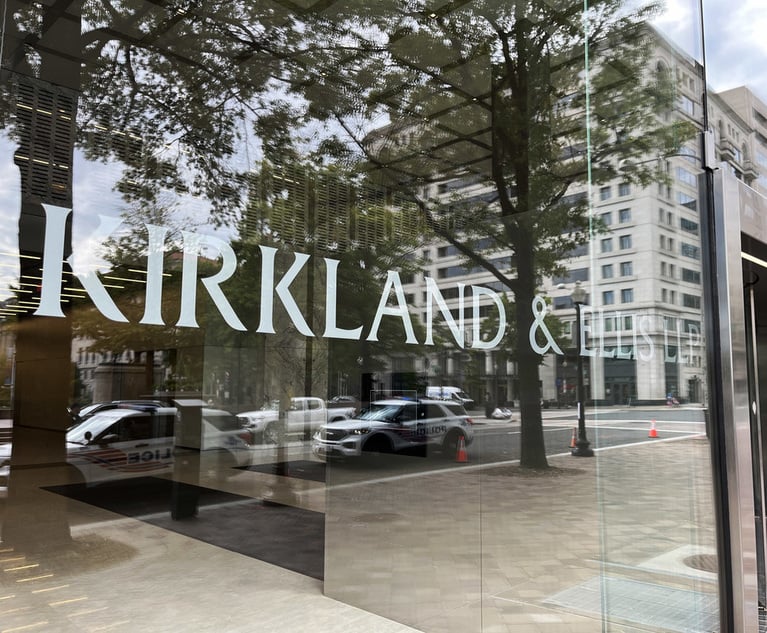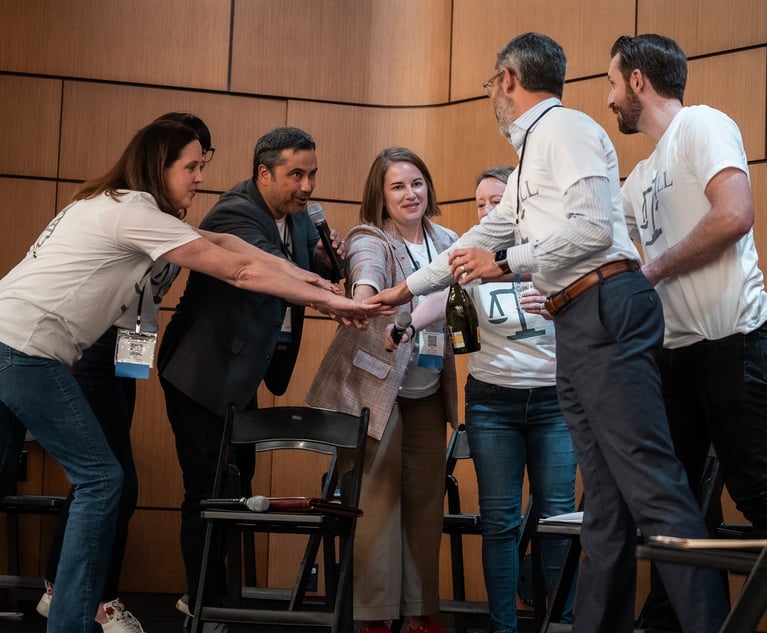 From left to right: Katherine Minarik, group general counsel at cleverbridge and ChIPs Honor Roll Committee co-chairwoman; Laura M. Burson, a partner with Sheppard Mullin Richter & Hampton; Sangeeta G. Shah of Brooks Kushman; and Noreen Krall, ChIPs co-founder and board chairwoman.
From left to right: Katherine Minarik, group general counsel at cleverbridge and ChIPs Honor Roll Committee co-chairwoman; Laura M. Burson, a partner with Sheppard Mullin Richter & Hampton; Sangeeta G. Shah of Brooks Kushman; and Noreen Krall, ChIPs co-founder and board chairwoman.New Survey Seeks Gender Parity Across IP Practices
A new survey conducted by nonprofit ChIPs and the Diversity Lab seeks to move the needle forward by examining law firms' efforts to promote the inclusion and advancement of women in IP.
October 30, 2018 at 04:40 PM
4 minute read
For decades, the ranks of women lawyers practicing in the intellectual property field have been dwarfed by the number of men.
A new initiative hopes to change that reality by mapping the landscape more clearly with a survey of efforts to promote the inclusion and advancement of women in law firm IP groups.
The Inclusion Blueprint Survey is an initiative launched by ChIPs, a nonprofit founded in 2005 by seven female IP leaders that focuses on advancing women in technology, law and policy.
Conducted in August in collaboration with the Diversity Lab, which has made waves in Big Law with initiatives such as the Mansfield Rule and OnRamp Fellowships, the Inclusion Blueprint Survey attempts to measure gender diversity among law firm leadership and to get qualitative information about the work experiences of female IP lawyers.
“We wanted it to be something that was going to encourage firms to do something, so that's why it's not just measuring head count,” said Karen Royer, executive director of ChIPs. “It's really looking at what types of activities are firms either doing now or committing to do in the future to really move that needle, because at the end of the day that's really what we want to have happen.”
Compared with other areas of practice in the legal profession, women are dramatically underrepresented in intellectual property. A 2017 study by ALM Intelligence found that women made up only 27 percent of lawyers in the IP space in Big Law, making it one of the practice areas with the smallest share of female lawyers.
Though the first iteration of the survey was released to law firms last year, Royer said that ChIPs decided to revamp it, turning to Diversity Lab and its CEO, Caren Ulrich Stacy, for guidance.
A survey of nearly 50 questions was sent to 59 law firms across the Am Law 200; 35 completed it. Law firms were asked about their efforts to monitor and measure lawyers' work experiences, including billable and nonbillable work allocation; gender-neutral leave options; pay equity; sponsorship; involvement in client pitches; origination credit; and other developmental and advancement opportunities.
“The hope is the more of those activities they're doing, the more women you're going to see succeeding,” Royer said. “It's not a matter of saying, 'Oh, I have X number of women in leadership.' It's a matter of what are the types of activities that you're doing within a firm to help promote women into those folds and encourage them and give them more exposure.”
ChIPs and the Diversity Lab scored firms' responses, ranking some of the legal industry's highest performers. Baker Botts; Brooks Kushman; Dechert; Goodwin Procter; Morrison & Foerster; Perkins Coie; Reed Smith; Sheppard, Mullin, Richter & Hampton; Taft Stettinius & Hollister; and White & Case scored the highest, ranging from 36 to 39.5 out of a possible 46 points.
 Brooks Kushman, a Southfield, Michigan-based IP firm, and Los Angeles-based Sheppard Mullin had the highest overall point total on the survey and earned the distinction of “Top Honor Roll Awards.” Both will have the opportunity to prepare a CLE for other ChIPs members and pitch to two or more of the 14 participating legal departments, including Amazon Inc., Apple Inc., Broadcom Inc., Cisco Systems Inc., Facebook Inc., Hewlett Packard, Microsoft Corp. and Oracle Corp, for additional work.
Brooks Kushman, a Southfield, Michigan-based IP firm, and Los Angeles-based Sheppard Mullin had the highest overall point total on the survey and earned the distinction of “Top Honor Roll Awards.” Both will have the opportunity to prepare a CLE for other ChIPs members and pitch to two or more of the 14 participating legal departments, including Amazon Inc., Apple Inc., Broadcom Inc., Cisco Systems Inc., Facebook Inc., Hewlett Packard, Microsoft Corp. and Oracle Corp, for additional work.
Royer said ChIPs and the Diversity Lab intend to issue the survey again next year and are hoping that more firms will participate. They also hope that as the survey progresses, it will be adapted to look at other practice areas and tackle gender parity.
Royer added that ChIPs and the Diversity Lab are working to get their in-house departments to push law firms and demand to see more women, whether that means first-chair or pitching work.
“We're excited, this being the first year, and we'll be really curious to see what happens next year,” Royer said.
READ MORE:
This content has been archived. It is available through our partners, LexisNexis® and Bloomberg Law.
To view this content, please continue to their sites.
Not a Lexis Subscriber?
Subscribe Now
Not a Bloomberg Law Subscriber?
Subscribe Now
NOT FOR REPRINT
© 2024 ALM Global, LLC, All Rights Reserved. Request academic re-use from www.copyright.com. All other uses, submit a request to [email protected]. For more information visit Asset & Logo Licensing.
You Might Like
View All
T14 Sees Black, Hispanic Law Student Representation Decline Following End of Affirmative Action

Fired Kirkland Associate's Gender Bias Lawsuit to Enter Private Mediation

Duane Morris Uses Nonequity Partnership as 'Income Shifting' Device, Class Action Contends
5 minute read
Diversity Pros Hope Work Allocation Offers a Key to Building Inclusive Law Firms
5 minute readTrending Stories
Who Got The Work
Michael G. Bongiorno, Andrew Scott Dulberg and Elizabeth E. Driscoll from Wilmer Cutler Pickering Hale and Dorr have stepped in to represent Symbotic Inc., an A.I.-enabled technology platform that focuses on increasing supply chain efficiency, and other defendants in a pending shareholder derivative lawsuit. The case, filed Oct. 2 in Massachusetts District Court by the Brown Law Firm on behalf of Stephen Austen, accuses certain officers and directors of misleading investors in regard to Symbotic's potential for margin growth by failing to disclose that the company was not equipped to timely deploy its systems or manage expenses through project delays. The case, assigned to U.S. District Judge Nathaniel M. Gorton, is 1:24-cv-12522, Austen v. Cohen et al.
Who Got The Work
Edmund Polubinski and Marie Killmond of Davis Polk & Wardwell have entered appearances for data platform software development company MongoDB and other defendants in a pending shareholder derivative lawsuit. The action, filed Oct. 7 in New York Southern District Court by the Brown Law Firm, accuses the company's directors and/or officers of falsely expressing confidence in the company’s restructuring of its sales incentive plan and downplaying the severity of decreases in its upfront commitments. The case is 1:24-cv-07594, Roy v. Ittycheria et al.
Who Got The Work
Amy O. Bruchs and Kurt F. Ellison of Michael Best & Friedrich have entered appearances for Epic Systems Corp. in a pending employment discrimination lawsuit. The suit was filed Sept. 7 in Wisconsin Western District Court by Levine Eisberner LLC and Siri & Glimstad on behalf of a project manager who claims that he was wrongfully terminated after applying for a religious exemption to the defendant's COVID-19 vaccine mandate. The case, assigned to U.S. Magistrate Judge Anita Marie Boor, is 3:24-cv-00630, Secker, Nathan v. Epic Systems Corporation.
Who Got The Work
David X. Sullivan, Thomas J. Finn and Gregory A. Hall from McCarter & English have entered appearances for Sunrun Installation Services in a pending civil rights lawsuit. The complaint was filed Sept. 4 in Connecticut District Court by attorney Robert M. Berke on behalf of former employee George Edward Steins, who was arrested and charged with employing an unregistered home improvement salesperson. The complaint alleges that had Sunrun informed the Connecticut Department of Consumer Protection that the plaintiff's employment had ended in 2017 and that he no longer held Sunrun's home improvement contractor license, he would not have been hit with charges, which were dismissed in May 2024. The case, assigned to U.S. District Judge Jeffrey A. Meyer, is 3:24-cv-01423, Steins v. Sunrun, Inc. et al.
Who Got The Work
Greenberg Traurig shareholder Joshua L. Raskin has entered an appearance for boohoo.com UK Ltd. in a pending patent infringement lawsuit. The suit, filed Sept. 3 in Texas Eastern District Court by Rozier Hardt McDonough on behalf of Alto Dynamics, asserts five patents related to an online shopping platform. The case, assigned to U.S. District Judge Rodney Gilstrap, is 2:24-cv-00719, Alto Dynamics, LLC v. boohoo.com UK Limited.
Featured Firms
Law Offices of Gary Martin Hays & Associates, P.C.
(470) 294-1674
Law Offices of Mark E. Salomone
(857) 444-6468
Smith & Hassler
(713) 739-1250










